

AGRICULTURE
Assin South schools prioritise PFJ to feed students
Senior High Schools in the Assin South District of the Central Region have resolved to take advantage of the Planting for Food and Jobs (PfJ) initiative of the government to cultivate arable crops to feed the over 6,000 students in the area.

Date Created : 2/12/2019 1:14:50 AM : Story Author : GNA
The move, which is being executed in collaboration with the Ministry of Food and Agriculture (MoFA) seeks to inculcate the habit of eating home grown foods among students for increased local production.
It is also aimed at reducing government's expenditure on food for feeding students in schools as well as drastically reduce the huge food imports to help solve the country's balance of payment challenges.
Mr. Jacob De-Graft Sackey, the District Director of Agriculture, who made this known in an interview with the GNA, mentioned some of the beneficiary schools as Manso, Adankwaman, Nyankomasi and Nsuta SHS’s.
In its broader vision, the initiative would be expanded to provide food to schools in some of the most deprived communities, with at least one hot nutritious meal, prepared from locally grown foodstuffs, on every school going day.
He described the programme as an effective strategy for increasing enrolment, attendance, retention and even performance of school children in deprived communities, as well as reducing hunger, malnutrition and poverty. It would also serve as the yardstick for measuring the attainment of the Sustainable Development Goals (SDGs).
He charged basic school authorities to initiate special programmes to inculcate farming habits in the children at their formative ages to enable them accept agriculture as a lucrative profession in future.
"Failure to educate the young ones on the need to take agriculture seriously would drastically affect national development in future when the current cream of ageing farmers retire" the Agric Director noted.
He said not withstanding the enormous challenges facing agriculture across the country, the district was doing tremendously well and praised the hard work and dedication of farmers and the staff of the Ministry of Agriculture.
Mr. Sackey explained that moving Ghana beyond aid meant that the country would have to make conscious efforts, through policy interventions and programmes, to emancipate the economy from foreign dependence.
According to him, leveraging on agriculture with proper planning, monitoring and control as well as active extension services was one key measure to become independent.
He lauded the contributions of rural women farmers in the district and encouraged more women to boldly embrace government policies and venture into farming, take advantage of all opportunities to empower themselves to improve upon their livelihoods.
He called for the abolition of obnoxious cultural and traditional practices that hampered the economic empowerment and development of women, adding that, marginalisation of women in decision making and accessing arable lands were among the reasons for the extreme poverty among rural women.
“This situation is just one of the strong underlying factors enhancing poverty, unemployment and hardships among women and families in the various communities in Ghana, especially in the rural areas, where farming is the main stay of the people” he stressed.
He said his outfit would continue to engage women in agriculture to train and empower them to increase crop yield to boost agricultural production while increasing their incomes for improved socio-economic standards.
He called for support from government and other women rights advocate groups to consider the plights of women in agriculture to stem all negative practices against them.



 facebook
facebook
 twitter
twitter
 Youtube
Youtube
 +233 593 831 280
+233 593 831 280 0800 430 430
0800 430 430 GPS: GE-231-4383
GPS: GE-231-4383 info@ghanadistricts.com
info@ghanadistricts.com Box GP1044, Accra, Ghana
Box GP1044, Accra, Ghana